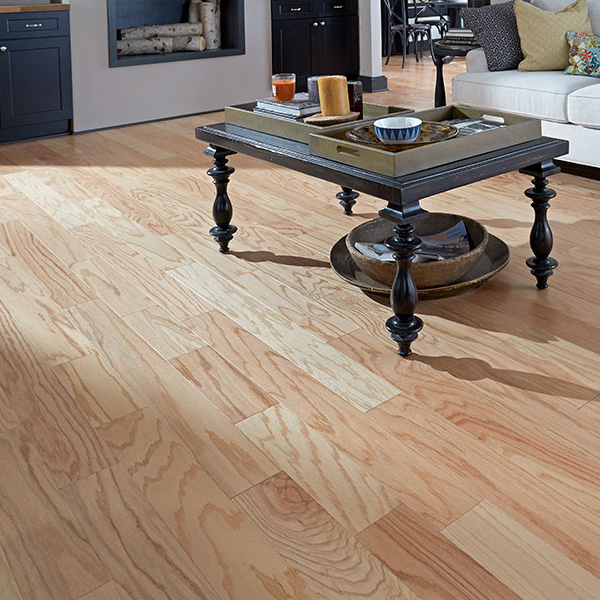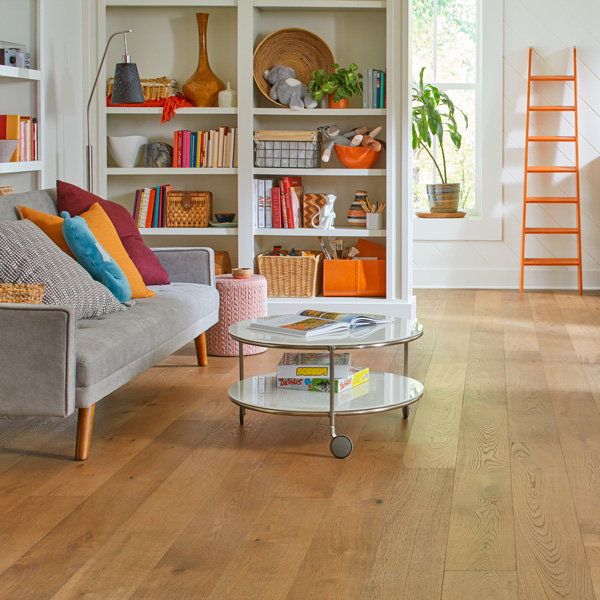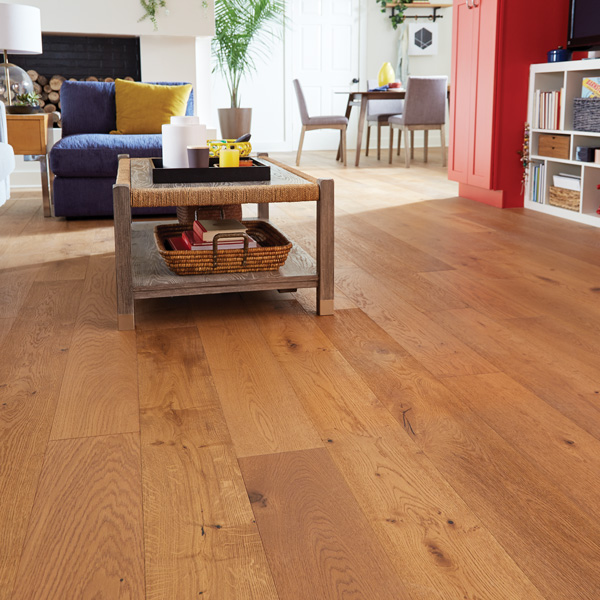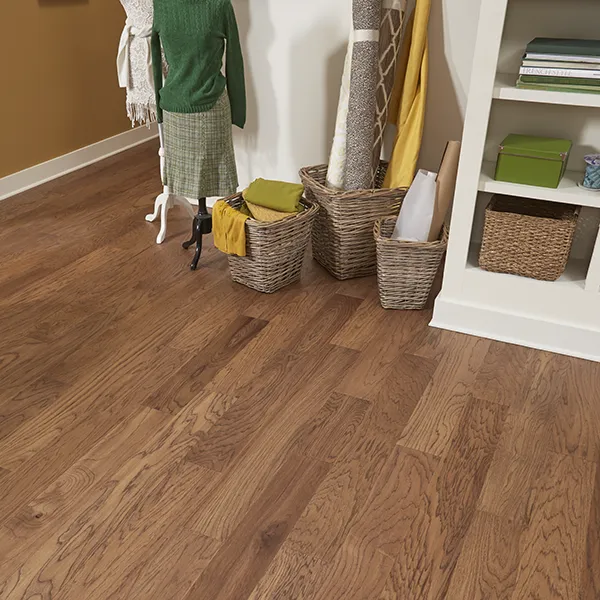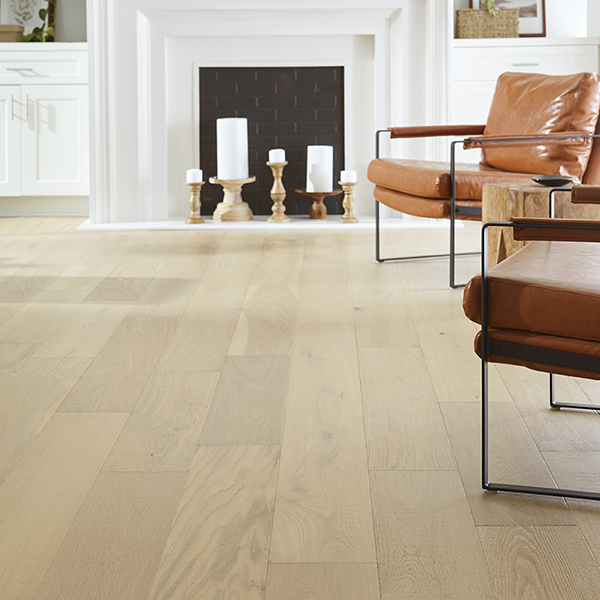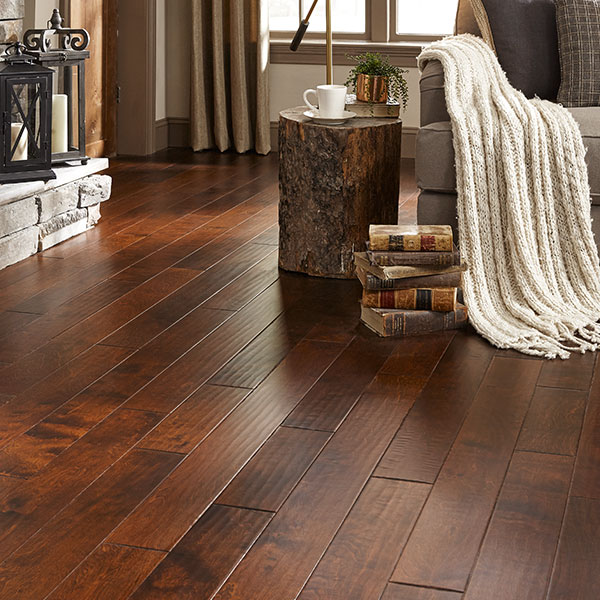Engineered Hardwood Flooring
Learn More About Engineered Hardwoods BelowEngineered Hardwood Flooring
Learn More About Engineered Hardwoods BelowAbout Engineered Hardwoods
Engineered hardwood floors are a modern variation of the traditional hardwood floor. With advancements in technology, floor manufacturers have created a versatile hardwood flooring with amazing stability, making it perfect for wide plank widths and spaces with humidity changes. Engineered hardwood flooring is made of several overlapping layers of wood, with the top layer being the same wood as a traditional solid hardwood plank. Essentially, if you walk across an engineered floor and then you walk across a solid floor, your feet have touched the same wood. Engineered floors can more easily support wider widths and tend to bow less in longer lengths because of the overlapping grains underneath the surface layer.
About Engineered Hardwoods
Engineered hardwood floors are a modern variation of the traditional hardwood floor. With advancements in technology, floor manufacturers have created a versatile hardwood flooring with amazing stability, making it perfect for wide plank widths and spaces with humidity changes. Engineered hardwood flooring is made of several overlapping layers of wood, with the top layer being the same wood as a traditional solid hardwood plank. Essentially, if you walk across an engineered floor and then you walk across a solid floor, your feet have touched the same wood. Engineered floors can more easily support wider widths and tend to bow less in longer lengths because of the overlapping grains underneath the surface layer.
Our Engineered Hardwood Lines
Blue Ridge Series
Hardwood Base Panel & Core
Nail, Staple, Glue or Float Installation
Aluminum Oxide
Cape Neddick Series®
3/8″ Engineered European White Oak
Light Wire Brushed Surface
Suitable For Any Level of Your Home
Portsmouth Series
7-1/2” Wide Planks For a High End Look
Traditional Oak Species With a Modern Twist
Aluminum Oxide Finish
Find Your Floors!
Get All Your Documents in Order

Checklist
You don’t need to be an expert to get the right solid hardwood flooring for your home or business. That’s our job. We offer full support to all of our retailers, in the very rare event that the retailers themselves aren’t sure about a particular situation. That said, it is certainly helpful to know which questions to ask. That is why we provide this Customer Checklist, to help you make the best decisions for you.

Warranty
The Impressions Hardwood Collection is proud of the beautiful hardwoods we sell and we stand by our products. Not only do we put forth every effort to create unique, rich flooring but also we go to great lengths to ensure that our floors last. Every series of our solid hardwood flooring comes with a Lifetime Structure and Wear Warranty. Please see our complete warranty for details.

Installation
Whether you are hiring a professional to install your engineered hardwood flooring or you are a very brave and skilled do-it-yourselfer, we recommend that you be familiar with the installation instructions for your new flooring. That is why were are happy to provide a Engineered Hardwood Installation Guide.
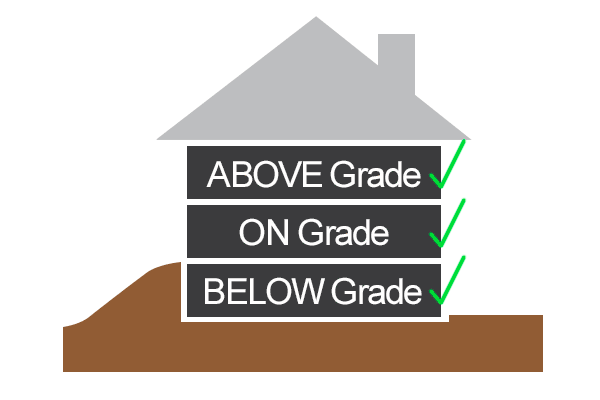
On which level is the floor?
With engineered hardwoods, your placement options open up. Able to be placed below grade or in higher humidity areas, engineered hardwoods can give you the look and feel of a solid in areas where no solid should go. While engineered hardwoods are versatile, they should not be installed in active water areas such as a full bathroom. For areas at risk of excessive moisture, a manufactured wood-alternative such as the Windlass Collection should be considered.
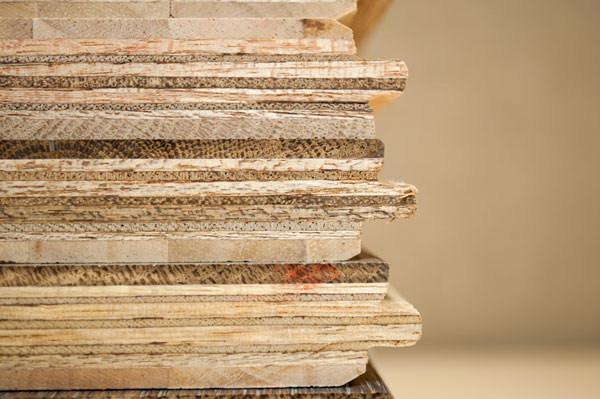
What is your subfloor?
It is a common misconception that engineered hardwood flooring is not a “real” hardwood floor. An engineered hardwood floor is comprised of several layers of wood, pressed and glued together with a criss-crossing grain pattern. The top layer is the very same wood that is used in a traditional solid hardwood.

Which tree is best?
What kind of wood should you choose? Is one wood better than another? The answers are varied and unique to your specific situation. Are there four legged friends tracking across your floor? Is the floor in a high traffic area? Will there be children’s toys or office chairs or dropped cutlery making their presence felt? The wood you choose should be based on what happens on it.
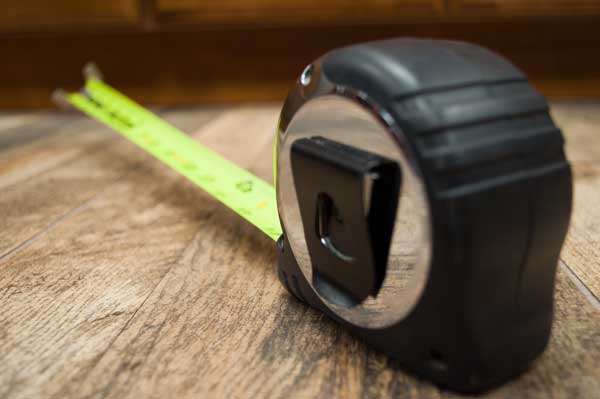
How much do you need?
Once all of the questions have been answered, there is still one very important decision. Buying too much flooring is obviously a waste of money, but buying too little can also cost you since a second load involves a second delivery truck. Even if there is someone else calculating this, it’s still a good idea to understand how they got the number. (Not saying, just saying…)

On which level is the floor?
With engineered hardwoods, your placement options open up. Able to be placed below grade or in higher humidity areas, engineered hardwoods can give you the look and feel of a solid in areas where no solid should go. While engineered hardwoods are versatile, they should not be installed in active water areas such as a full bathroom. For areas at risk of excessive moisture, a manufactured wood-alternative such as the Windlass Collection should be considered.

What is your subfloor?
It is a common misconception that engineered hardwood flooring is not a “real” hardwood floor. An engineered hardwood floor is comprised of several layers of wood, pressed and glued together with a criss-crossing grain pattern. The top layer is the very same wood that is used in a traditional solid hardwood.

Which tree is best?
What kind of wood should you choose? Is one wood better than another? The answers are varied and unique to your specific situation. Are there four legged friends tracking across your floor? Is the floor in a high traffic area? Will there be children’s toys or office chairs or dropped cutlery making their presence felt? The wood you choose should be based on what happens on it.

How much do you need?
Once all of the questions have been answered, there is still one very important decision. Buying too much flooring is obviously a waste of money, but buying too little can also cost you since a second load involves a second delivery truck. Even if there is someone else calculating this, it’s still a good idea to understand how they got the number. (Not saying, just saying…)

